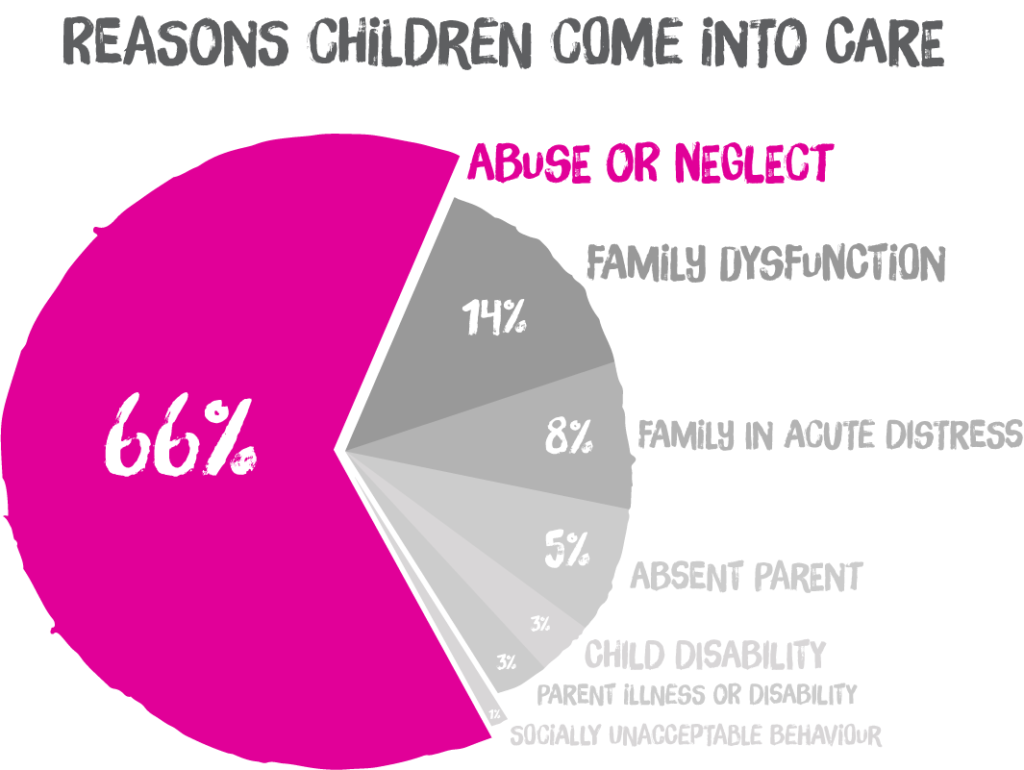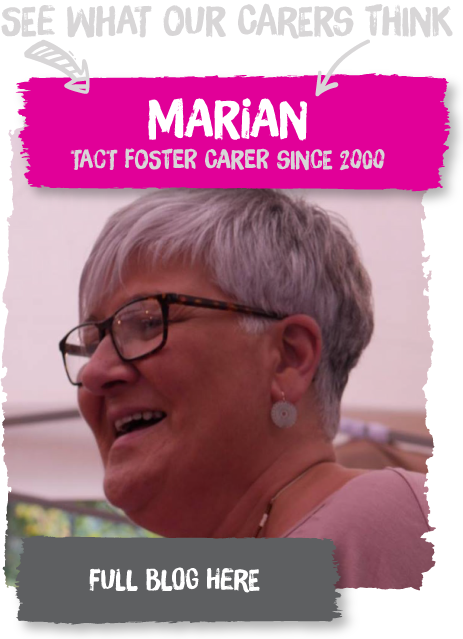Why do children need foster care?
Children require foster care for lots of different reasons. It could be that there is an illness in the family, leaving the family home without an appropriate parent or guardian. Many of these cases require short term foster care. Unfortunately, the majority of children need to spend longer in the care system due to concerns of neglect or abuse. In these cases, long term foster care could be required.
Whilst it can be stressful for children to leave the family home, it is sometimes necessary to do so in order to minimise trauma that can impact on a child’s behaviour, their ability to learn and develop skills, their mental health and wellbeing and their ability to form relationships with other people.
The specific nature of why children come into the care system is dependent on their personal circumstances. This chart provides a guide as to the main reasons why children require foster care:

The vast majority of children come into care because of incidents or situations that are beyond that young person’s control.
Who decides that a child requires foster care?
This decision is made by a Local Authority, but only after all other appropriate alternatives have been considered. For example, sometimes a young person can be cared for by another family member or friend. This is called Kinship Care.
In many cases, children come into care with their parent or guardian’s consent via a voluntary Section 20 agreement. Some examples of scenarios that could instigate a Section 20 are:
- There is a concern about the care or accommodation of a young person
- An illness is preventing a parent or guardian from caring for their children
- An admission from a parent or guardian that they feel unable to care for their children
A Section 20 is a short term measure, with a view to address any issues and reunite children with their birth families.
Unfortunately, due to more serious issues such as neglect or abuse, a Care Order can sometimes be served. Care Orders are issued by a court, and are applied for by the Local Authority if a child is suffering, or is at risk of suffering, significant harm. Although a care order can be lifted by a court, the severity of the circumstances behind its issue can mean that children stay in care for a longer period.
Whatever the decision, it will always be made with the best interests of the child(ren).
What does a foster carer do?
Being a foster parent is so much more than providing a bed and putting a roof over someone’s head – it is helping each child to build a better life.
A carers’ role is to provide day-to-day care for children and young people placed with them, as well as supporting with their education, health and general wellbeing. All carers will follow a specific Placement Plan which is created for each young person in their care. This plan details how the child’s needs should be met during the placement. Foster carers are highly skilled, and are trained in strategies and behavioural management techniques.
Many aspects of the day-to-day care will be very similar to caring for any child, and could include school or college runs, help with homework, timely mealtimes and management of any medication or general health appointments.
Whilst a nurturing and caring home is a key element in foster care, many children will have experienced some degree of trauma due to abuse, neglect or disruption. For these reasons, a therapeutic approach to care is essential. This could include a range of therapies such as those focussing on speech and language, art and play and cognitive/behavioural.
Foster parents are also required to keep regular and accurate records detailing how a placement is progressing in relation to the Care Plan. They will also be included in meetings with a number of professionals such as social workers, health care workers and teachers.
Foster carers are fully supported by their own allocated social worker, along with any additional resources offered by their agency or local authority. At TACT, reinvesting in additional training and support for our carers is important because the better our support, the better our carers can change young people’s lives.
It is important to note that foster carers do not have parental responsibility for a child in their care. Depending on their legal status, parental responsibility rests either with their parents or with a local authority. However, foster carers are granted delegated authority, meaning they are able to make common every day decisions for a young person.
Read some of our inspiring foster carer stories.

“It has been an incredible journey. Seeing these children reaching their potential fills me with pride. When you see them growing in confidence and starting to achieve their goals, no matter how big or small, it’s the best feeling.”
What is matching in foster care?
Matching in foster care is a vital step that could mean that children and young people thrive in a particular household.
It begins with a detailed ‘referral’ document that is either used internally by a local authority or sent to Independent Agencies (IFAs). The referral highlights the key needs of the young person and is used by social workers to find potential carer-to-child matches.
Matching usually begins with logistical elements such as geography, age, gender and contact with birth family – and will then also include more in-depth criteria such as educational needs, any peer groups that need to be avoided and any additional needs of the child. All this information is used to find the best possible household for a young person.
When potential matches have been identified, they are fully considered by both foster carers and social workers. If the match is approved by all, there is usually an introduction stage which gives the young person a chance to visit the household prior to the placement commencing.
As TACT is a charity, matching is everything. It’s what achieves great outcomes for children whilst also helping to prevent placement disruptions and breakdowns.
What are the outcomes of foster care?
As children come first in all foster care scenarios, positive outcomes for young people is paramount. Whilst the ideal is for children to be reunited with their birth family, this is not always possible.
In order to ensure that the best possible outcomes are achieved for young people, all children in care are provided with a Care Plan, which will detail how the young person’s needs should be met, and covers areas such as health, education and contact with their birth family. It can also contain a Pathway Plan, which helps to prepare a young person for the transition from care into adulthood.
Here at TACT, we reinvest surplus income into providing specialised services in order to help young people achieve their goals and aspirations, such as our dedicated Education Service, Health Service and our TACT Connect community which supports care-experienced young people into adulthood.
“Before going into care I really struggled with school. However, I managed to get my education back on track, and thanks to additional support and counselling I left school with GCSEs and A levels. Personally, I am now a more confident person than I was when I entered care.”
– Care-experienced young person








